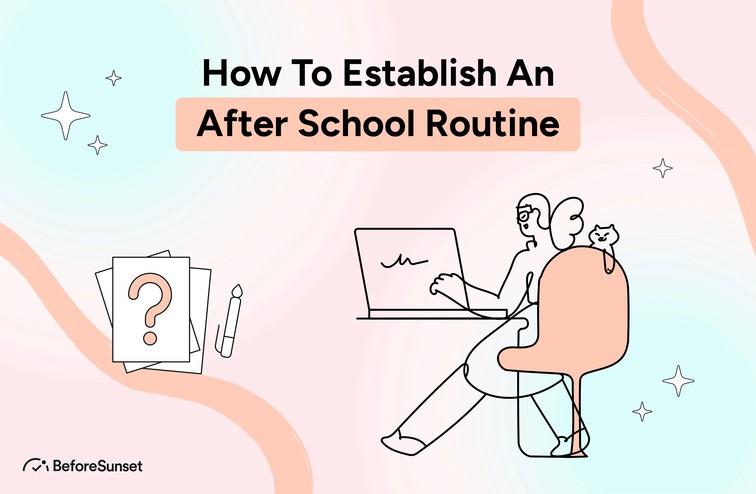A schedule for the hours after school is similar to a road map that helps you go around a day of learning and activities. It's a useful and transforming tool that gives vital time after school hours structure, productivity, and a feeling of purpose for both children and parents.
An established pattern is essential during this period since homework, extracurricular activities, personal development, and downtime all need to be balanced. This blog will discuss how to create a productive day-after-school activities schedule.
This journey toward creating an after-school routine promises to unlock the potential for success and well-being in your daily life, whether you're a student hoping to excel academically, a parent hoping to provide a balanced and nurturing environment for your child, or anyone looking to maximize their time and productivity.

Establishing a Routine
The first step in giving our everyday life structure and order is to establish a routine. Whether it is a morning routine, quiet time, bedtime routine, or homework time it is important to establish a routine for school time. Routines have a crucial part in forming our habits and behavior, whether it's in the areas of personal growth, employment, education, or just keeping a well-balanced lifestyle.
They offer a solid foundation that enables us to properly manage our time, lessen stress, and accomplish our objectives.
Setting Goals
Setting goals is an essential and effective process that enables people and organizations to clarify their aims, map out a road to success, and track their progress. Goals provide people with a feeling of direction and purpose, inspiring them to work toward their desired results.
Setting good objectives may significantly impact success and contentment, whether in one's personal life, school, job, or company. SMART objectives are ones that are precise, measurable, attainable, relevant, and time-bound.
Actionable plans are then created, and methods are regularly monitored and modified to stay on course. This proactive approach to goal planning assists people and organizations in turning their hopes and desires into an attainable reality. One may unleash potential, improve motivation, and eventually experience more success and happiness by creating goals.
Creating a Schedule
Making a timetable is the act of planning your time wisely to increase productivity and achieve your objectives. It entails planning and scheduling precise times for a variety of activities, including work, study, personal responsibilities, and pleasure.
You may avoid procrastination, give critical activities the attention they require, and maintain a healthy work-life balance by successfully managing your time. An effective timetable not only makes it easier for you to manage your time effectively but also gives you a sense of control and predictability in your daily activities.
As a result, you'll be more productive, less stressed out, and feel more accomplished as you work toward your goals.

Making it Fun and Engaging
It takes adding components that arouse excitement, interest, and delight in jobs and activities to make them enjoyable and engaging. In terms of education, the workplace, and personal growth, this strategy may be especially helpful.
People may make normally tedious or difficult activities pleasant by using creativity, gamification, positive reinforcement, or incorporating personal hobbies. This improves productivity and learning on a deeper level while also boosting motivation.
People are more likely to stick with something, overcome challenges, and accomplish their goals when they find joy and involvement in it, which starts a beneficial cycle of ongoing development and fulfillment.
Communicating the Plan with Family and Friends
It's essential to let family and friends know about your intentions for a number of reasons. It promotes openness and makes sure that your loved ones are aware of your commitments, objectives, and priorities, which can result in improved collaboration and support.
By communicating your goal, you may also assist in preventing disputes or misunderstandings brought on by incongruous timetables or expectations. Involving family and friends in your plans may also result in helpful feedback, participation, and recommendations that will make it simpler to accomplish your objectives while keeping important relationships.
Building solid relationships with your social network through effective communication helps foster a feeling of shared responsibility and accountability.

Implementing the After School Routine
Setting up a schedule for after school is essential for turning a thought into a useful daily routine. Although the concept of arranging the hours after school may seem straightforward, the actual implementation may have a significant influence on one's life.
The idea of a well-organized routine takes shape here, in the area of execution, allowing people—in particular students—to take advantage of the benefits of efficient time management, productivity, and personal growth.
Planning Ahead for the Day/Week Ahead
A smart strategy for effectively managing your time and activities is to plan for the coming day or week. It entails taking the initiative by arranging your obligations, making clear goals, and allotting time for varied pursuits.
You can feel more in control of and have a feeling of direction in your daily or weekly life by anticipating what has to be done and making a well-organized schedule. This technique not only increases productivity but also aids in setting priorities, lowering stress at the last minute, and encouraging a healthy work-life balance.
A key tool for accomplishing goals, reducing time waste, and ensuring that you can go through your day or week with purpose and ease is effective preparation.
Develop Strategies to Manage Time and Energy Efficiently
Creating time and energy management plans is crucial for increasing productivity and preserving well-being. It entails a variety of strategies, including work prioritization, boundary setting, and routine optimization.
Making to-do lists, using digital tools for scheduling and reminders, and employing time management strategies like the Pomodoro method for concentrated work intervals are all part of effective time management. Take regular pauses, follow a balanced diet and exercise routine, and get enough sleep as ways to regulate your energy successfully.
By putting these ideas into practice, people can not only complete more tasks in less time, but they can also prevent burnout, maintain productivity, and achieve a better work-life balance.

Identifying Triggers that May Interfere with Completion of Tasks/Goals
Finding triggers that can prevent you from completing activities or goals is similar to turning on a flashlight to reveal any possible roadblocks in your way. These triggers include a variety of internal and environmental elements that might impair your ability to concentrate, stay motivated, and make progress.
Self-doubt, a lack of self-control, or a tendency to put things off are examples of internal triggers, whereas distractions from the outside world, unplanned disruptions, or competing priorities are examples of external triggers.
The first step in managing these triggers successfully is to recognize them. By recognizing their existence, you give yourself the authority to develop plans of action and safety measures to lessen their effects. This helps you remain on track, enhance productivity, and improve your odds of successfully attaining your intended goals.
Implement Healthy Habits into Your Daily After-School Schedule
It is a prudent and enjoyable decision to include healthy habits into your everyday after-school routine. You can take care of your physical and mental health by making time for things like family time, physical activity, healthy snacks for snack time, and enough sleep.
Exercise may increase your energy and lower your stress levels, and a balanced diet gives your body and mind the nutrients they need to function at their best. Additionally, setting aside time for leisure activities, hobbies, or mindfulness exercises might aid in your ability to relax, rejuvenate, and generally maintain good mental health.
These healthy routines help you feel better right away and lay a solid basis for long-term physical and mental resilience, empowering you to attack activities and objectives with more vigor and concentration.

Tips for Crafting a Successful Routine:
Set Specific Objectives: To start, list your goals and the things you hope to achieve with your program. Your decisions and priorities will be influenced by having a defined purpose.
Prioritize Tasks: Prioritize your tasks by deciding which ones are most crucial to achieving your objectives. Make sure they have certain times in your schedule.
Be Realistic: Be realistic and refrain from packing your schedule with too many obligations. To avoid frustration and fatigue, set attainable goals.
Time Blocking: Set aside certain time slots for various pursuits, including work, play, exercise, and personal development.
Consistency: Establish a regular routine by rising and falling asleep at the same times each day. Your routine will be strengthened by consistency.
Include Breaks: To refuel your energy and keep your attention, include brief rests in between jobs.
Prepare for Emergencies: Consider probable hiccups or unforeseen incidents and make preparations for them.
Stay Flexible: While regularity is important, try to remain adaptable when required. Life is dynamic, and adaptability is essential for dealing with shifting conditions.
Optimize Productivity: To maximize productivity, schedule difficult or high-priority chores for when you are at your most alert and focused.
Limit Distractions: Reduce interruptions by establishing a distraction-free atmosphere when working or engaging in other concentrated activities.
Include Self-Care: Schedule time for self-care activities that enhance your physical and mental well-being, such as exercise, meditation, or hobbies.
Review and Modify: Consistently examine the efficacy of your routine. Maintain alignment with your goals and evolving demands by making modifications as necessary.
Track Your Progress: Keep a log of your victories and milestones to track your development and maintain motivation.
Ask for Support: Share your routine with family or friends and let them know you need their help and compassion, especially if you have to make modifications to common schedules.
Stay Positive: Maintain a positive outlook about your routine by saying "Stay positive." Keep in mind that it is a tool to assist you in achieving your objectives and raising your standard of living.
Prioritizing Tasks According to Importance/Urgency
Prioritizing tasks based on how important and urgent they are is a key skill for managing time well. The Eisenhower Matrix, which is often used for this, divides jobs into four sections:
Urgent and Important: These jobs need to be done right away and should be done first. They usually have to do with important dates, problems, or important matters.
Important but Not Urgent: These tasks are important and help me reach my long-term goals and grow as a person, but they are not urgent. They should be put on a plan and given their own time so that they don't become important in the future.
Urgent but Not Important: These jobs may seem important, but they don't help you reach your long-term goals. If you can, give them to someone else or limit how much they affect your plan.
Not Urgent and Not Important: These jobs are not important or urgent. They often get in the way and should be ignored or kept to a minimum if you want to be as productive as possible.

Allowing Flexibility in Case Plans Change Unexpectedly
Because life is always unpredictable, it is essential to allow for some flexibility in your daily or weekly schedule. Various factors, including crises, last-minute chances, or unforeseen occurrences, might cause plans to shift abruptly.
You'll be better able to deal with these adjustments without getting stressed out or overwhelmed if you include flexibility in your routine. This calls for having wiggle room in your calendar or buffer time, as well as an adaptable attitude.
In the end, flexibility contributes to a more balanced and robust approach to managing your time and accomplishing your goals by enabling you to embrace new possibilities that may unexpectedly appear. Flexibility not only helps you manage interruptions more graciously.
Create The Perfect Routine With BeforeSunset AI
Creating the perfect routine with BeforeSunset AI is like having a personal assistant dedicated to optimizing your time and tasks. You can meticulously plan your day, allocate time for various activities, and set priorities with ease.


